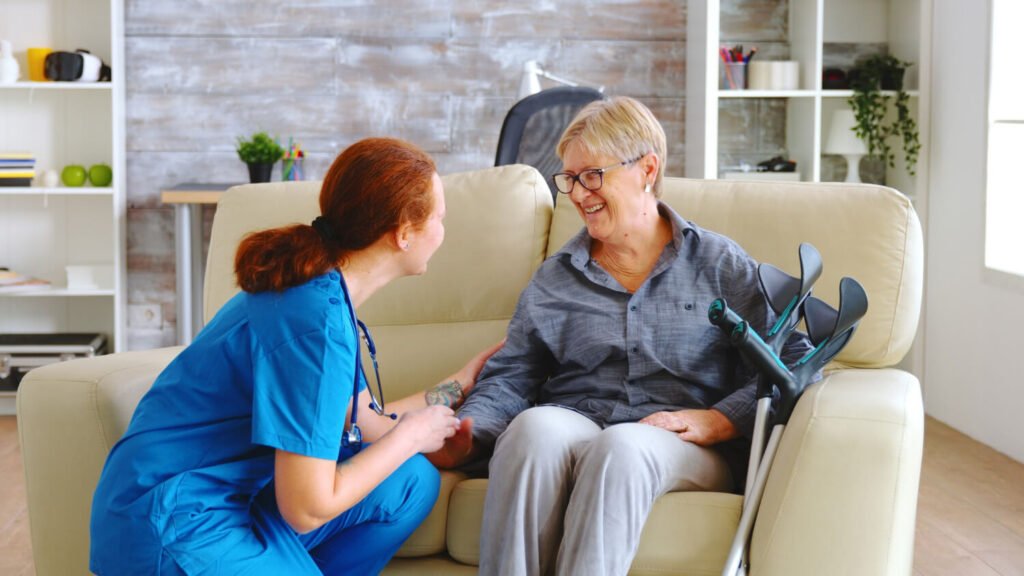
Taking care of patients in my early 20s is what got me started on my own caregiving journey. The professional nurses at the clinic where I volunteered were great role models. They taught me important lessons that I still use today.
This week, many of those lessons are coming back to me.
Honoring National Nurses Week With Lessons That Lighten the Load
National Nurses Week (May 6 to 12) is a special time to celebrate the heart and hard work of nurses everywhere. While most family caregivers don’t have formal training, they do share something deeply important with nurses: a calling to care.
The 2025 National Nurses Week theme is “The Power of Nurses™.”
As we honor nurses this week, let’s also reflect on what family caregivers can learn from them. Nurses have powerful skills — not just in medicine and health care, but in managing stress, staying grounded and giving care with calm confidence. And the good news? These are skills us family caregivers can learn too.
Here are five remarkable lessons you can carry into your own caregiving journey.
1. Stay calm by creating a care routine.

One of the first things nurses do when starting a shift is check their schedule, supplies and patient list. They don’t try to “wing it.” They lean on structure to stay grounded.
Family caregivers can benefit from this same approach. Having a basic daily routine can lower your stress levels, reduce decision fatigue and create more peace of mind at home.
Start small:
- Choose regular times for meals, medications and rest.
- Keep a printed checklist or use a simple planner.
- Leave space for surprises, because caregiving is full of them.
2. Learn the power of “compassionate detachment.”
Nurses care deeply, but they also learn not to take every emotion home with them. This practice is called compassionate detachment. That means showing love and concern while protecting your own emotional energy.
For family caregivers, this can be hard. You love your person. But holding every struggle in your heart can lead you to caregiver burnout.
Here’s how to start:
- Take a deep breath before reacting.
- Remind yourself: “I’m doing my best. I don’t have to try to fix everything.”
- Talk to a friend, support group or therapist to help process those big feelings.
I know. You’re probably thinking that practicing detachment is cold-hearted, but no. It’s wise. You really can care for others and protect your peace of mind at the same time.
3. Embrace the team approach.

In hospitals, nurses work as a team. They pass off tasks, ask questions and lean on each other for support. Family caregivers often try to do it all alone.
But, you don’t have to carry the whole load yourself.
Try these steps:
- Make a list of things you could delegate, like grocery shopping, errands or cleaning.
- Ask siblings or family members to take one task a week.
- Join a local caregiver support group or online forum.
Even if others can’t provide hands-on help, emotional support still matters. You deserve a team, even if it’s just one or two trusted people.
4. Use your voice: Document, ask and speak up.
Professional nurses are known for their clear communication. They write things down, ask questions and speak up when something doesn’t seem right.
As a caregiver, you’re also an advocate. You can:
- Keep a care journal to track symptoms, meds and moods.
- Ask doctors to explain complex medical terms in plain language.
- Speak up if you feel your loved one’s needs aren’t being met.
You don’t have to be perfect. Just be persistent. Nurses learn by doing, and you can too.
5. Practice quick self-care moments throughout the day.

Nurses are trained to take breaks — even short ones — to stretch, breathe or grab a healthy snack. These tiny resets help them keep going.
In contrast, family caregivers often skip self-care because there’s “no time.” But remember: self-care doesn’t have to be long to be helpful.
Try these ideas:
- Step outside for five minutes of sunshine.
- Breathe deeply while performing chores like washing dishes or laundry.
- Keep a favorite Biblical verse nearby to read in those especially hard moments of care.
These mini moments of care can refill your cup and keep caregiving burnout at bay.
Honoring Nurses — and Yourself

National Nurses Week reminds us of the amazing work caregivers do, both professional and family caregivers. If you’re a family caregiver, know this: the skills you use every day such as compassion, strength and flexibility are the same ones professional nurses rely on too.
You may not have a uniform, but you too have a calling. And you’re not alone. Keep showing up with love. Keep learning as you go. And when it gets hard, remember that even the best nurses sometimes ask for help.
Professional and Family Caregiving FAQ
1. What is National Nurses Week?
National Nurses Week is celebrated from May 6 to 12 each year in the U.S. It honors the dedication, compassion and expertise of nurses across the country.
2. Can family caregivers really learn skills from professional nurses?
Absolutely. While caregivers don’t receive the same training, many of the skills nurses use, like creating routines and practicing emotional balance, are helpful and teachable.
3. What’s the best way to ask for help as a family caregiver?
Start by being specific. For example, instead of saying, “I need help,” try, “Can you sit with Mom for an hour on Saturday so I can rest?”
4. What if I feel guilty taking a break?
Feeling guilty is common, but taking breaks isn’t selfish. It’s smart. Even short breaks help you care better and longer.
5. How can I stay organized like nurses do?
Use tools like a caregiver planner or notebook. Keep a daily checklist and write down important updates. This helps reduce forgetfulness and brings peace of mind.
Let us know in the comments how you’ve been inspired by a nurse, or how you use these tips in your caregiving!
Leave a Reply